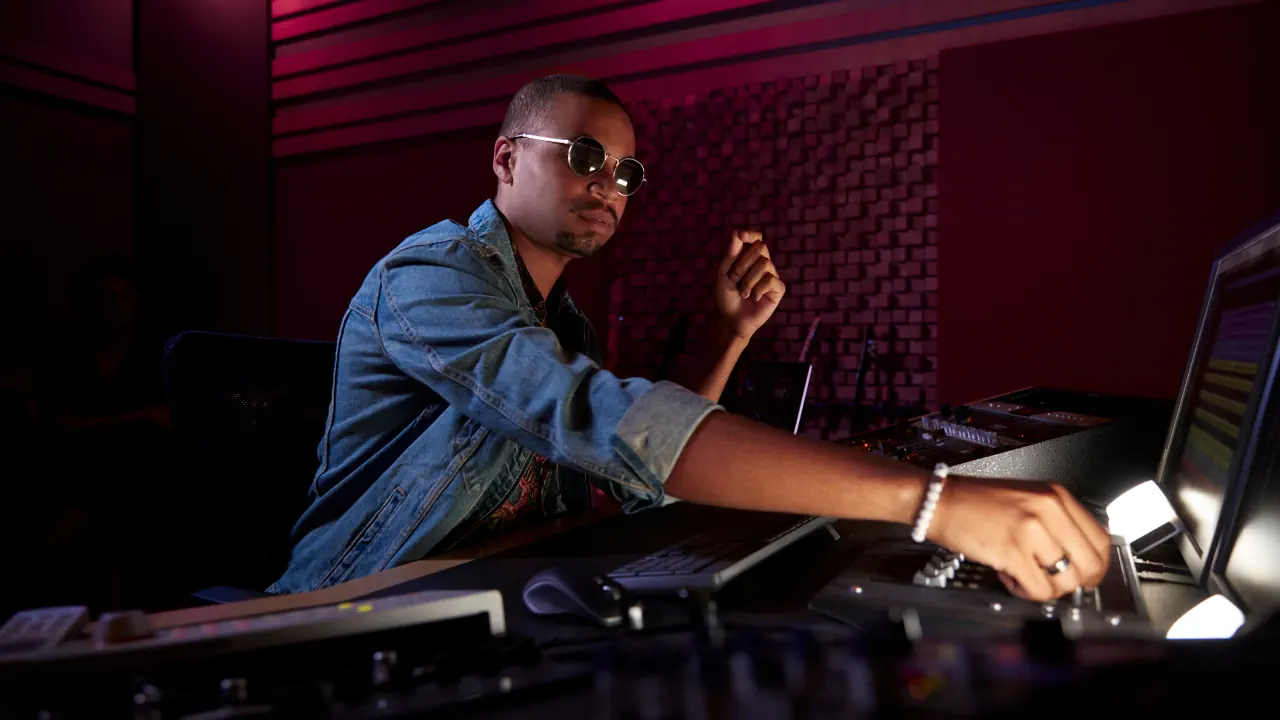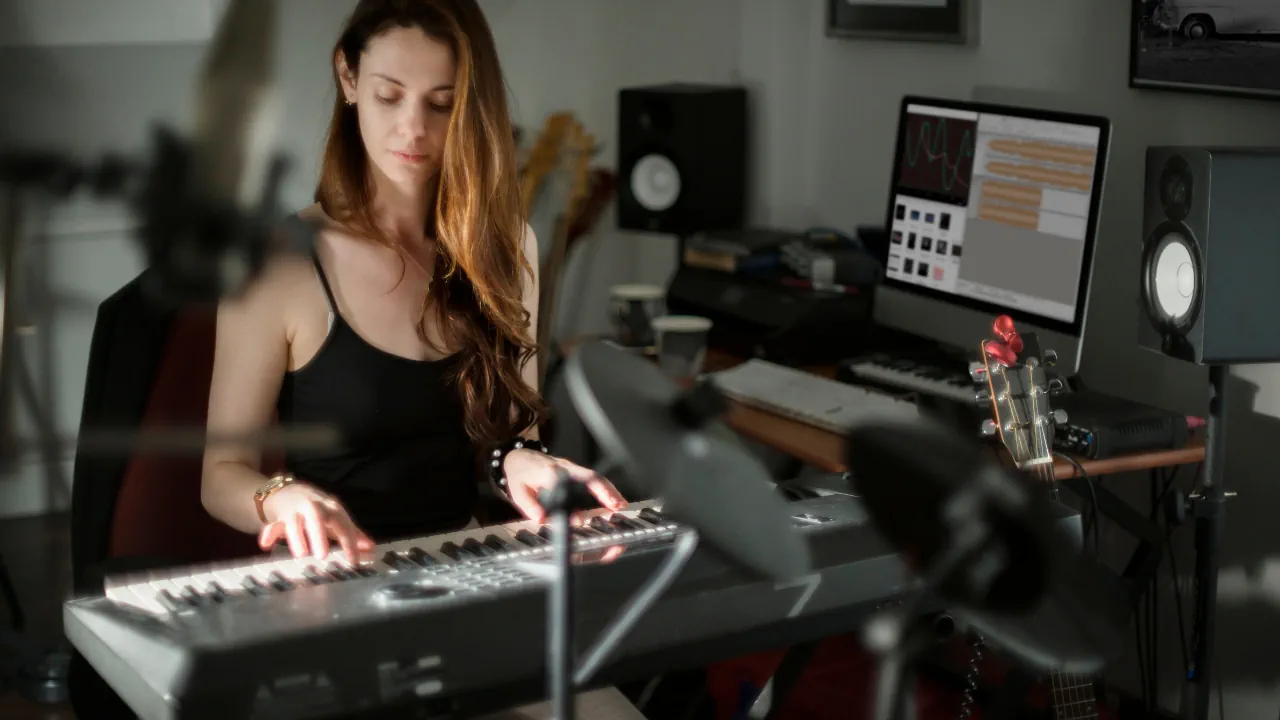
What is music production? Music production is creating a piece of music from start to finish.
It involves various stages, including writing and composing songs, arranging and sequencing musical ideas, sound design, mixing, and mastering.
A music producer plays a crucial role in overseeing and guiding the production process to ensure the final product meets the artist’s vision.
In the article, I’ll provide simple and easy insight to follow.
Understanding the Music Production Process
Music production is the process that encompasses a series of steps to create a professional-quality piece of music.
It begins with the initial idea or inspiration and progresses through writing, recording, arranging, mixing, and mastering.
Each stage shapes the final sound and ensures the music achieves its desired impact.
The Role of a Music Producer
A music producer is the driving force behind successful music production. They work closely with artists and musicians to bring their vision to life.
The producer oversees every production process, from selecting and arranging songs to working with session musicians, engineers, and other professionals to achieve the desired sound.
Getting Started as a Music Producer
There are several essential steps for a beginner aspiring to be a producer. First, you’ll need to familiarize yourself with the necessary production equipment.
This includes a digital audio workstation (DAW), studio monitors, microphones, and audio interfaces.
Using this equipment effectively is vital for producing professional-quality music at home.
How Do I Start?
Essential Equipment for Production
To start with production, you will need the right equipment. Investing in a good-quality DAW is essential.
A DAW is a software application that allows you to record, edit, and mix audio. Various options, such as Ableton Live, FL Studio, and Logic Pro, are available.
Choosing a DAW that best suits your needs and workflow is crucial.
Choosing the Right Production Software
In addition to a DAW, you will need other software plugins and virtual instruments to enhance your sound.
These can include synthesizers, samplers, and audio effects. Research and experiment with different software to find the ones that align with your preferred genre and production style.
Recording Music in a Home Studio Setup
Setting up a home studio is a cost-effective way to start producing music.
You will need a quiet space, acoustic treatment to control the sound, and professional-grade microphones and audio interfaces for recording.
Learning the basics of audio engineering will also help you achieve high-quality recordings.
What are the Stages of Music Production?

Writing and Composing Songs
The first stage involves writing and composing songs. This is where the creative process begins, and you can experiment with different melodies, chord progressions, and lyrics.
It is essential to capture your ideas by recording or writing them down.
Arranging and Sequencing Musical Ideas
Once you have your initial musical ideas, the next step is to arrange and sequence them.
This involves structuring the song, deciding the order of sections, and creating transitions between different parts.
This stage allows you to shape the overall flow and dynamics of the music.
Sound Design and Programming
Sound design and programming involve creating and manipulating sounds to achieve the desired sonic palette.
This can include synthesizer programming, sampling, and audio effects to add depth and texture to the music.
Paying attention to sound design is crucial for creating a unique and engaging sound.
What is Mixing and Mastering in Music Production?
The Importance of Mixing
Mixing is the process of blending individual tracks to create a cohesive and balanced overall sound.
It involves adjusting levels, panning, equalization, and audio effects to enhance clarity and create a pleasing sonic experience.
A well-mixed track ensures that each element of the music is heard without overpowering others.
Mastering Your Tracks for a Professional Sound
Mastering is the final stage, where the tracks are prepared for distribution.
It involves applying the final touches to the mix, such as adjusting volume levels, equalization, compression, and adding overall polish.
Mastering ensures that the music translates well across different playback systems and platforms.
The Role of a Mastering Engineer
Mastering is often done by a dedicated engineer with expertise in music’s final processing. They ensure the tracks are cohesive, balanced, and ready for commercial release.
A mastering engineer uses specialized tools and techniques to optimize the audio quality and address technical issues.
How Can I Become a Music Producer?
Learning Production Techniques
Investing time and effort in learning various production techniques is crucial to development. Use online tutorials, courses, and mentorships to develop your skills.
Please practice producing music regularly and look for feedback to improve your abilities.
Building a Portfolio and Getting Noticed
Building a strong portfolio of your work is essential for establishing yourself as a producer.
Create compelling and diverse music that showcases your abilities across different genres and styles.
Share your music on platforms like SoundCloud and YouTube to gain exposure and attract potential collaborators or clients.
Pursuing a Career in the Music Industry
The music industry offers various career paths for aspiring producers. You can work as a freelance producer, collaborating with artists and other industry professionals.
Alternatively, you can seek employment in recording studios, publishing companies, or record labels.
Networking and building relationships within the industry can also open doors for opportunities.
What are Some Tips for Successful Production?
Experimenting with Different Styles of Music
As a music producer, it is essential to be open to exploring various styles of music.
Experiment with different genres and incorporate diverse influences into your productions. This versatility will make you a well-rounded producer and expand your creative possibilities.
Using a Digital Audio Workstation (DAW) Effectively
Become proficient in using your chosen DAW. Take the time to explore its features, shortcuts, and capabilities.
Learning to navigate your DAW efficiently will streamline your workflow and allow you to focus on the creative aspects of music production.
Collaborating with Other Musicians and Producers
Collaboration is a great way to grow as a music producer. Working with other musicians and producers may allow you to learn from their experiences and gain new perspectives.
It also expands your network, potentially leading to more opportunities and creative collaborations.
Conclusion
In conclusion, what is music production? Well, it’s all about the magic of making music sound great.
It’s about turning a song idea into a masterpiece that gets people tapping their feet and singing along.
And who better to guide you through this process than an experienced record producer?
These pros know how to make your track sound good, whether it’s pop, rock, electronic, or any other genre of music.
If you’re a beginner eager to dive into music production, don’t worry!
There’s plenty of help out there to get you started. You’ll find all the resources to learn the ropes, from online tutorials and forums to beginner’s guides to music production.
Remember the essential music production equipment like a computer, audio interface, and headphones. So grab your gear, and let’s start making some awesome beats!
FAQs – What Is Music Production
1. What types of music can be produced?
Music production covers various genres and styles, including pop, rock, hip-hop, electronic, classical, and more.
2. What does being involved in music production mean?
Being involved in music production means working on various aspects of creating, arranging, recording, mixing, and mastering music.
3. What is the world of music production all about?
The world of music production revolves around creating and manipulating sound to produce high-quality tracks pleasing to the ears.
4. What is Music Production 101?
Music Production 101 is the starting point for beginners who want to learn the basics of creating music using software and audio equipment.
5. How can I produce music?
You’ll need a computer for music production, software or digital audio workstation (DAW), and headphones or speakers to listen to your creations.
6. Can music production be a career?
Absolutely! Music production can be a fulfilling career where you can work as a music producer, sound engineer, composer, or even pursue a career in music marketing.
7. What is a producer responsible for?
A producer guides the creative process, oversees recording sessions, arranges music, and ensures a high-quality final track.
8. Can I produce my music?
Yes, you can produce your music at home or in a professional studio with the right tools and knowledge.
9. Do I need a particular computer for music production?
While it’s not mandatory, having a computer designed for music production can enhance your workflow and ensure the smooth operation of various software and plugins.
10. Are there any tips for music production?
Yes! Here are some music production tips: Learn music theory to understand melody, harmony, and rhythm better.
Focus on sound design and production techniques to create unique sounds.
Master your music by ensuring the final mix sounds polished and professional.
Continuously develop your music production style and techniques.
